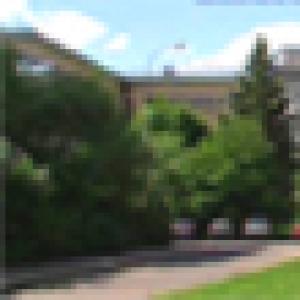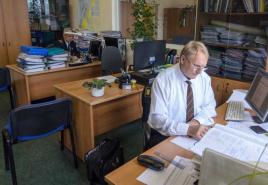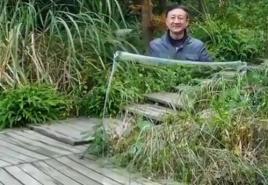Why do we need knowledge of the geography of the past. Why is geography important in the modern world? Navigation, cellular and satellite communications
I recall the immortal expression of Madame Prostakova from Fonvizin's "Undergrowth": "Why teach geography, the cab will take you himself?" Perhaps she was right when she spoke of “a cab that will take you wherever you order”? There are specially trained people who will take me to the right place, a lot of maps, including digital ones, colorful guidebooks, GPS-receivers, travel agencies, an infinite number of geographical videos. Finally, the internet!
Studying with children in a local history club, of course, we cannot know how specific children study geography in a particular school - we only see the result, and it is most often deplorable! Some schoolchildren do not know where Kaliningrad is located, and where Chukotka is located, and how they look on the map, or, for example, even having a dacha near Moscow, they do not always know which side of Moscow it is located.
When going on a hike, you sometimes have to reinforce the guys with the knowledge that they should take out of the course. elementary school"Natural History". It was there that the conceptual apparatus was formed, and how miserable it is today lexicon schoolchildren: not every “clearing” from a “field” will be distinguished, but a “field” from a “forest clearing”, or “arable land”, “hay” from “straw”, a “path” from a “clearing”, a “road” from a “path” ”, “pond” from the “lake”, “stream” from the “spring”, not everyone knows what a “pool”, “bend” is ... - the concepts are mixed into a mess. Where is there to analyze or read the map! It is amazing: after all, this is far from “highly specialized knowledge” - it does not require any calculations, equipment, or special talents to acquire it. It would seem that studying geography “for oneself” is easy and simple from childhood: based on adventure novels and films, on events in the world, on music and other facts of art from different countries and cities, on one’s own, after all, trips is a real pleasure requiring no effort. Geography should be one of the most interesting school subjects!
But we have to deal with children from different schools: municipal, private, gymnasiums - and unfortunately, the overall picture is about the same. Children can quickly name the height of Everest or the depth of Lake Titi-Kaka, but at the same time it’s easy to get confused which way from Moscow you need to go to Tver or why you don’t need to take an ax on a mountain hike at an altitude of 2 thousand meters! And that trees do not grow at this height - it becomes a real discovery for them! Ebb and flow, the presence of white nights in the northern regions, which allow you not to stock up on flashlights in June, remain behind school geographical knowledge!
What's the matter? Schoolchildren do not have a figurative idea of such simple things and, as a result, they lose interest, the desire to learn more and deeper.
Clearly, tourism is practical use geography, because without knowledge of geography it is impossible to be a tourist! This form of work with children protects them from virtual knowledge, gives meaning to actions and knowledge. It is noticeable how interest in geography in general and in a particular area increases sharply during campaigns: the world it is perceived in a completely different way - the child develops real images (mountains, lowlands, swamps, plains, etc.)! Only at the school desk, studying the map, he cannot imagine a real picture of the area!
Why do we need geography?
Then, that human environmental activity is also closely related to geography and, by and large, the culture of its conduct is formed in the study of natural history from simple phenological observations of the weather. Only on this basis can he put together in his mind an idea of what a meteorologist does, what makes up the weather, how the strength of the wind and cloud cover are determined.
In our opinion, ignorance of geography is an indicator of ideal, refined ignorance. And what is most interesting is that it is often found in people who have already been everywhere where it is popular to be. Although many people talk about how well they had a rest in Thailand, and not just Thailand - they don’t immediately find Eurasia on the map!
Modern children travel a lot, visit various interesting places: from Veliky Ustyug and Finland to Cyprus and Egypt, but on trips they are more concerned about whether there will be a shower, whether there will be 3 or 4 meals a day. Unfortunately, this is what primarily worries parents: after the trip, they will not ask the children what the route was, what interesting things they met, what excited you the most, but first they will ask how they slept and what they ate! In this sense, parents have a very relaxed state, society is used to the fact that the better the service, the more they do for you, the better!
Unfortunately, we are very light on what children take away from trips, we do not require them to independently master new information and knowledge. So it turns out: "Where have you been?" - "On some sea!" Why is everyone passing? Because children do not take any real, independent part in these trips! According to the same principle, knowledge of geography is often given at school: learned - told, postponed - forgot! After the lesson, this knowledge will not be required to be applied anywhere, but it must certainly be in demand!
But on a hike, the child asks: “When will we come to the parking lot?” - "Take a map, look at the scale, remember how far we traveled yesterday, compare, try - calculate for yourself!" It is important not to give a ready answer to the question, but to suggest in which direction you need to look for it!
Protecting a child from the need to make an effort can kill his interest in the subject! Formal geography lessons cannot give a figurative idea of nature, relief, vegetation features, and as a result, do not reinforce interest in studying it!
Interest in geography in a child can be ignited by the simplest outings in nature. For the successful development of geography, impressions are needed: about the height of mountains, about the depth of reservoirs, about distances, about areas, they need to compare everything with something: if, for example, you walk 10 kilometers on a hike with them, you can explain what 100 is in reality km. Walking into nature, they enthusiastically learn how to navigate the terrain on the map, topography. In addition, preparing for a trip is a very serious geographical study of the area where the trip is being prepared: you need to know general geographical information about the travel area, meteorology, get information about the flora and fauna - after all, even a discussion of the necessary equipment will require practical explanations from them related to the geography of the area: whether there are mosquitoes or not, whether there is a large amplitude of temperatures day and night, and we are talking only about the most necessary equipment that we have to carry, whether we can use mushrooms and berries, whether there is fish or not. To understand all this, geographical knowledge is needed.
On a hike, we merge with nature, someone said: it’s at competitions that people come up with rules according to which they overcome difficulties, and on hikes, nature dictates the rules, and what it requires from you, you must fulfill!
What else gives a person knowledge of geography and the ability to use their geographical knowledge?
It gives a person the opportunity to get out of difficult situation without panic: for example, getting lost in an unfamiliar place, gives confidence in life, not helplessness, but breadth of views in everything - geography is the basis for a person’s worldview, it teaches to live on Earth. Now quite regularly reports of accidents are transmitted - with students, adults. Previously, this was less precisely due to the fact that people were protected by knowledge about nature, natural phenomena - amateur tourism has been widespread since the 60s, there were no accidents, although they did not particularly study in tourist clubs, and even at school did not teach life safety. Excessive protection of a child from accidents does not guarantee safety - people get lost in the mountains, in the forests, and even quite recently in the Moscow region there was a case when a woman with a child got lost and died in the forest, and this is five kilometers from home!
Only one form of insurance is effective - it's a five in geography!
The Transfiguration Tourist and Local History Club has been operating for more than ten years; it is a structural subdivision of the children's Orthodox Movement Vestniki. Considering the indicated difficult circumstances with the quality school education, in 2011, the teachers of the Movement approached the leadership of the Faculty of Geology of Moscow State University with a proposal to implement a joint project "My universities: geography concerns everyone." There have been several meetings, but the interest of the guys in these meetings is great.
The main task of this project was to arouse a keen interest in one of the main ideological subjects of the school - geography! Living impressions of living people are very touching for children: a live meeting with a specialist who is not indifferent to them, a geographer, is understandable and close to the child. After all, this is in the consumer format of a lecture: “You talk - I will listen”, but the active interaction of adults and children, which allows you to enter them in a state of active development of the subject: this, for example, is a symposium format in which children are in a state of searching for answers to questions. They do not just listen, but also analyze, formulate questions, problems, get acquainted with the culture and protocol of conducting scientific discussions and discussions, learn to listen to another, analyzing the speeches of another, getting some kind of internal result. Or is it a meeting in the form of a press conference, when the guys are required to actively participate, prepare questions for the speaker in advance, and be able to draw conclusions and conclusions.
On the other hand, such meetings gave an incentive to invite friends and parents.
Today it is quite difficult to overcome the general desire for informational knowledge - it is almost impossible, but it is necessary to at least try to direct the geographical education of our schoolchildren along this vector - to give meaning to what they do and to combine disparate knowledge into a coherent picture of the world.
We are convinced that such meetings will expand the general geographical knowledge of our schoolchildren, as well as their ideas about the directions and specifics of education at the Faculty of Geography of Moscow State University, perhaps this will instill in children a taste for real university science.
Meshcheryakova E. I. Sergievskaya N. P.
|
Leave your comment, thanks! |
I graduated Pedagogical University in the specialty "teacher of geography" and worked at the school for 3 years, and therefore I think that this is rightfully my question. From personal experience, I can say that students in grades 6 and 7 are more interested in this subject than high school students. Geography itself, as a school subject, very interesting. You can tell children about the wonders of nature and the development of individual countries.
Why do students need to study geography?
Geography is the science that studies the earth. Remember that it consists of physical and economic parts. This is the only school subject that teaches to understand cause and effect relationships. Children comprehensively study the planet and human activities. You need to master this science in order to find out:
- how our Earth is arranged;
- how and where animals and plants live;
- how humans affect nature.
Knowledge of geography is needed during traveland I. A person is guided by a map, time zones. Tourists study the climate, the relief of their place of rest. If the student decides to go on vacation with his parents, he must study his route in advance.
Geography Meanings
It is simply impossible to assess the significance of this science. Geography is all around us and we live in it. Even a student knows all this. high school:
- school student understands that the world is one and indivisible. Every person is included in this world;
- geographical thinking is formed in the lessons. On its basis, children learn to understand that all objects and phenomena are in the relationship of space and allow you to be aware of the situation;
- in children formedhumanistic ideas about the conservation of nature and animals, the study of local attractions.
All this allows the student Rdevelop critical thinking, logic and compare actual data. Through the prism of science, acquaintance with the nature and labor activity of the people in different countries. And science itself finds vast significance in our life. Thanks to her, we are guided in life and constantly learn something new. Children, on the basis of the studied material, draw conclusions about different areas of life.
Why study geography? This question immediately brings to mind an episode with geography from Fonfizin's comedy "Undergrowth". I suggest you watch it.
Perhaps Madame Prostakova was right when she spoke of “a cab driver who will take you where you order”? There are specially trained people who will take me to the right place, a lot of maps, including digital ones, colorful guidebooks, GPS-receivers, travel agencies, an infinite number of geographical videos. Finally, the internet! AND modern schoolchildren ask the question: why study geography?
In a wide range of educational disciplines, geography is given a small place in the basic curriculum. For example, in the sixth grade, this is only one hour per week (excluding the regional component). In the seventh, eighth and ninth - two hours a week, in the tenth and eleventh - one hour a week, provided that the class is general education. And if the class has a certain profile, geography may not be studied at all. There are 9-10 hours left for all parallels instead of 17-20. The regional component has practically disappeared, children pay little attention to the study of their small homeland.
Another problem is that modern students have become much more rational and, accordingly, intensively study such subjects that will be useful not even in life, but when entering universities. Geography is not one of those subjects. Science, which should form the basis of economic, geographical specialties in universities, for some reason is completely ignored by them. Although, in my opinion, a manager needs geography more than social science. Even when entering a pedagogical university for a specialized specialty, we do not see geography, but all the same social science. Although, you see, it is difficult to imagine a competent international specialist or a manager of the tourism industry who does not know geography deeply.
Now such a field of knowledge as geography is represented in Russian classical universities (24 faculties) and pedagogical universities (41 faculties). In large universities and academies, these are separate faculties that graduate bachelors, specialists and masters in the relevant narrow areas of knowledge.
So according to statistics in the largest university in Chelyabinsk, SUSU entrance test in geography, you need to pass only 1 of more than 100 areas of the undergraduate program!
However, the Federal Law "On Education in the Russian Federation" formulates as a principle of state policy "the education of mutual respect, citizenship, patriotism, responsibility of the individual, as well as the protection and development of ethno-cultural characteristics and traditions of peoples Russian Federation in the conditions of a multinational state”, which is impossible without geography!
So back in 1845, by the highest order of Nicholas I, the Russian Geographical Society was founded. Today it is one of the oldest geographical societies in the world. It brings together experts in the field of geography and related sciences, as well as enthusiastic travelers, ecologists, public figures and everyone who seeks to learn new things about Russia, who is ready to help preserve its natural resources. Regional branches of the Company operate in each of the 85 constituent entities of the Russian Federation. Since 2009, the President of the Society has been Russian Defense Minister Sergei Kuzhugetovich Shoigu.
Since 2015 Russian geographical society on the initiative of the Chairman of the Board of Trustees of the Society V.V. geographical dictation. Its main purpose is to assess the level of geographical literacy of the population. This year, some students of our school took part in the dictation online.
In the context of the modernization of education, the requirements for the professional skills of a teacher are increasing. One of the requirements is the improvement of the lesson, which, despite the variety of forms of organization of learning, remains the basis educational process. The traditional conduct of lessons requires fundamental changes in connection with educational standards new generation. One of the main conditions for the effectiveness of the lesson is the employment of all students in the class productively. learning activities, teaching them to independently acquire knowledge and instill skills independent work. The system-activity approach is the basis of the modern geography lesson. The role of the teacher is not only to present educational material, check the learned content, and organize the activities of students with various sources of geographical information, formulate cognitive tasks and assist in solving educational problems, create situations of interaction.
Oddly enough, scientific and technological progress. The digital revolution has led to the emergence of electronic media and the ability to get instant access to any information, including geographic information. Internet, electronic maps, GPS navigation, etc. Why study dryly written geography textbooks and look at paper atlases when you can go online and see information about different parts of the Earth. IN last resort, purchase a DVD with geographical films. At the same time, the student does not care that the textbook is aimed at developing systemic and integrated thinking, and everything is chaotic on the Internet.
The value of school geography lies in the fact that it is the only school subject of an ideological nature that forms in students a comprehensive, systemic and socially oriented idea of the Earth as a planet of people. It is also the only subject that introduces them to the territorial approach as a specific method scientific knowledge. The value of geographical knowledge in the formation of personality allows us to formulate a common goal geographical education. Thus, students master a complete system of geographical knowledge and skills, the possibilities of their application in life, different situations, i.e. show competence. What competencies can be formed in geography lessons? - Value-semantic competences form an attitude to life, correctly place value orientations. - General cultural competencies are formed in the study of ethnic groups, family and social values, traditions and way of life different peoples. - Educational and cognitive competencies are formed in the lesson and extracurricular activities student, when he obtains knowledge from the world around him during excursions, learns to distinguish facts from conjectures, uses statistical information. - Information competencies involve the possession of modern media and information technology. For example, create a presentation for a lesson or extracurricular activity, show and analyze images of the studied territories from space. - Communicative competencies are formed in the process of communication, include knowledge of ways of interacting with others, teamwork skills, possession of various social roles.
Geography lesson in grade 5 according to GEF
Lesson Objectives:
- introduce students to a new subject - geography;
- to reveal the features of the course content;
- show practical value geography at different stages of the development of society;
- find out what problems geography solves;
- to acquaint with the methods of geographical science;
- introduce students to the new textbook and the requirements of the teacher.
Equipment: physical map of the hemispheres, portraits of travelers, famous geographers, atlases, contour maps, textbook, workbook "My simulator".
Cognitive component of the lesson: geography; tasks and methods of geographical science.
Activity component of the lesson: get acquainted with the text and non-textual components of the textbook, atlas, simulator; to study the features of the construction of sections and paragraphs; enter into a dialogue with the aim of determining the significance of geography for themselves and society.
Emotional and valuable component of the lesson: appreciate the importance of geographical science in modern world; understand the idea that geography is one of the ancient sciences and at the same time the most modern, allowing people to navigate the world and give answers to complex questions of the relationship between man, nature and society.
Working with the textbook: familiarity with the new textbook in the process of working with it.
Lesson type: introductory.
Learning new material
On this lesson The teacher has three main tasks.
First, it introduces students to the new subject- geography, its tasks and modern methods of research.
Secondly, it reveals the main features of a new geography textbook for students and the principle of working with it.
Thirdly, it focuses the attention of students on the fact that a successful study of geography is impossible without the use of geographical maps, as well as additional literature, Internet materials, periodicals and other sources of knowledge.
It is advisable to build a lesson based on the study of the content of a geography textbook. First, the teacher poses questions to the students, referring to their personal experience: what do they know about geography? With what or with whom do they associate geography? What would they like to learn by studying geography? What books or magazines have they read? What TV programs and films of geographical content have you seen? Where have students managed to visit in their area, country, world?
The teacher writes the answers to the questions posed on the board under the general title “Our geographical experience”.
Then students are invited to review and study the half title with the title of the topic (p. 3).
The teacher draws attention to the fact that the word "geography" is Greek and means "description of the earth". Geography deals not only with the description of complex processes on Earth, but also with their explanation and forecasting. Great scientists stood at the origins of geography: Strabo, who was called the Geographer, Eratosthenes, who wrote the essay "Geography". Since then, this word has become the name of the science of the planet Earth.
The history of geography began with travel and navigation. As a result, the geographical horizons of people expanded, new lands were mastered and then settled, and important information about them.
The first fragment of the paragraph is called "Why does a merchant need geography?". After studying this fragment of the paragraph, the teacher asks the students the question: where were the goods that surround you at home produced?
Next, the students discuss why we, modern people, geography; what it means for all people and for each of us personally; whether there are people among their relatives and friends whose profession is related to geography, can they name professions related to geography. The teacher asks what qualities, in the opinion of the students, people related to geography should have.
The main conclusion that geography helps us to see and reveal the image of the world, to navigate in it, students find on p. 5 textbooks.
To appreciate the value of geography, the teacher gives an example of how scientists evaluated geography. The outstanding Russian scientist M. V. Lomonosov wrote about the role of geography: “What is more useful for the human race to communicate their surpluses to each other, what is safer for those who swim in the sea, what is more necessary for traveling through different states, how to know the position of places, the course of rivers, the distance of cities, the size, abundance and proximity of different lands, the customs, customs and governments of different peoples? This is clearly shown by Geography, which exposes the vastness of the entire universe to a single look.. Our contemporary geographer V. S. Preobrazhensky believed that “Geography is a science that creates a special geographical picture of the world with a person, and this is not just a combination of the world and a person, it is a person’s awareness of his place in the world”. From these quotes it is clear that at all times scientists highly appreciated the importance of geography.
Each science sets itself tasks that are studied using certain research methods. Using the diagram on p. 6 "Problems of geography", students name these tasks.
For a clearer presentation of the methods of geographical science, students fill in a simulator or draw a diagram in a notebook:
The next stage of the lesson is getting acquainted with the textbook and the requirements for the geography lesson. First, students identify how the textbook is built, what topics and paragraphs it consists of. After carefully studying the diagram on p. 7, students will have a clear understanding of the structure of the textbook. The teacher draws attention to the fact that the symbol of the textbook is the North Star, which will serve as a guide and help to highlight the most important thing in the paragraph. Moving along the route laid out " polar star", students will be able to achieve good results and pass the “easy exam” to yourself, your parents, and your comrades.
At the end of each paragraph there is a “Remember” section, which gives the main terms, place names and names. They need to know and be able to find on the map. In order to better understand the material of the paragraph, students should answer questions and complete tasks under the headings “I know this”, “I can do this”, “I am interested in this”. The first rubric helps to assimilate the text of the paragraph, the second and third allow students to be creative in their approach, performing various tasks.
A trusted assistant that students should constantly turn to is the section “How to work better with a textbook in order to achieve success?” under the heading "Step by step" (p. 7). The study of this section introduces the basic techniques of working with the textbook.
The teacher draws attention to the cards placed at the end of the textbook, reveals their role and purpose. In class, students are introduced to workbook"My simulator" and its headings.
At the end of the lesson, the teacher explains the meaning of the weather calendar in the geography classroom, says that its systematic maintenance throughout the year is the business of class attendants.
Homework
- Study § 1.
- Answer questions 1-3.
- Complete task 4.
- Use labels to find out where your food came from. Fill in and analyze the table:
|
Name of food |
|||
|
General conclusion: |
|||
"Why do we need to study geography? Or how we study it on the Internet..."
Pupil
MBOU secondary school No. 73, Ulyanovsk
What is geography? Earth science? Yes, of course, this is the right definition, but, in addition, geography is a science, without which we would not be able to lead a full life. Don't believe? Let's imagine what would happen if everyone forgot about the existence of such a wonderful science as geography and consider one day in the life of any average person.
In the morning you wake up and rush to school, university, work or just some business, but you don’t know what time it is, what day, month or even year it is, and why? Because without geography there would be no time zones. Agree, a terrible picture! So we would live in ignorance.
After we've washed and cleaned ourselves up, we need to have breakfast, but where have our favorite foods gone? And they never were. If there was no geography, people would not explore other countries and continents, and would not bring products such as tea, coffee, cocoa, mango, vanilla, and even the familiar potato would not exist either.
After breakfast, we are going to leave the house, but how do we know what clothes to wear, because without geography there would also be no weather forecast and it would be impossible to predict rain, snow or ice, but I won’t even talk about tornadoes, hurricanes and floods.
Imagine that somehow, with grief in half, we nevertheless chose what to wear and went out into the street, but what is it, where have all the multi-storey buildings that are so familiar to us gone? Even ordinary, simple buildings have disappeared. Again, the lack of geography is to blame. Without taking into account the amount of winter precipitation, it is impossible to build a house: the roof may not withstand the mass of snow and collapse. Not taking into account probable natural disasters - too. Without geography, without surveys and knowledge of the geo-underlying, it is generally impossible to carry out design and construction. So we would have nowhere to live.
We didn’t want to walk and decided to go by car, but the trouble is, you won’t be able to do this either, because without geography there would be no different kinds of maps, and we wouldn’t know where we should go. Well, if the place you need to get to is nearby, then it will be much easier for you to get there, but still you will spend a lot of time looking, and if you suddenly need to get to another city, country, or in general, to another mainland? Without a map, you would not be able to travel.
Okay, let's say you got to where you were going. For example, this is a school. And what is there? You do not have such lessons as geography, history, biology and astronomy in your schedule. And all because without geography, these sciences will also disappear. So there would be no hikes, no cultivated plants, no celestial constellations, and certainly a person would not fly into space.
In the evening, having worked hard, we are in the mood for rest and entertainment. Without geography, there are no geographic coordinates on which all navigation systems are based. No navigation systems means no satellites, which means no satellite TV or mobile phones. Do all schoolchildren know that without geography their "favorite toys" - mobile phones will stop working? Agree, without geography, life would turn into chaos. Everything familiar and familiar to us would disappear, and we would again plunge into the primitive age. Now you understand how important science is geography.
Remember, have you ever said the phrase “Why should I learn this if I don’t need it in my life anyway!”? How is this why? Firstly, it's just interesting, secondly, in order to be a versatile person, and thirdly, imagine that all people will start to think the same way as you, then we will not have scientists, and there will be no one to conduct research and discover, something new and unknown. Well, not a very bright prospect. To prevent this from ever happening, I invite you to visit the blog .I assure you after you visit the blog and complete the tasks, you will reconsider your attitude to geography and love it just like the author of the blog, a teacher with many years of experience Borshch Elena Alexandrovna. There you can find a lot of new things and complete exciting tasks. In addition, this is a great way to combine business with pleasure - "sit" on the Internet and expand your horizons in geography. Let's take a closer look at the blog. It consists of 10 modules, each of which offers a service for completing a project with examples of other students' work and detailed instructions. In the proposed services, you can create quizzes, tests, crossword puzzles, maps, and even multimedia online ads. Pupils are happy to complete tasks and get excellent grades for this. Let's consider the 1st module as an example, it offers a service for creating slideshows and quizzes Photopeach.com with detailed instructions with pictures, starting from registration and ending with an explanation of how you can get the code for publishing a presentation on websites and blogs. Rest assured, with such a detailed explanation, you will succeed. This module also features the work of other students who have already completed the assignment in this service, so you can look at examples! Modules 2-10 also offer various services with instructions and examples. In addition, completing assignments is also a way to consolidate knowledge on English language, because most of the services are in this language. When creating didactic materials in geography in WEB2.0 services, we see the integration of such sciences as: geography, English, computer science. Studying geography remotely, mastering new Internet services, is interesting and exciting! As F. Bacon once said: “Knowledge is power, power is knowledge”, learn and improve your skills. Wish you luck!







